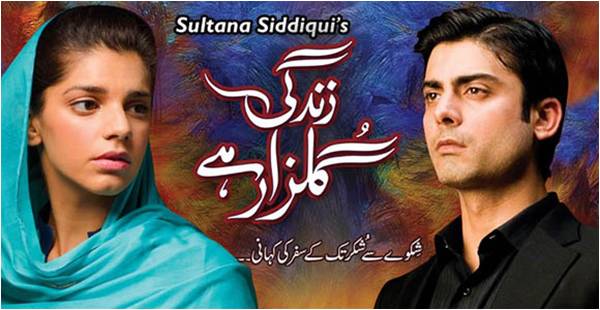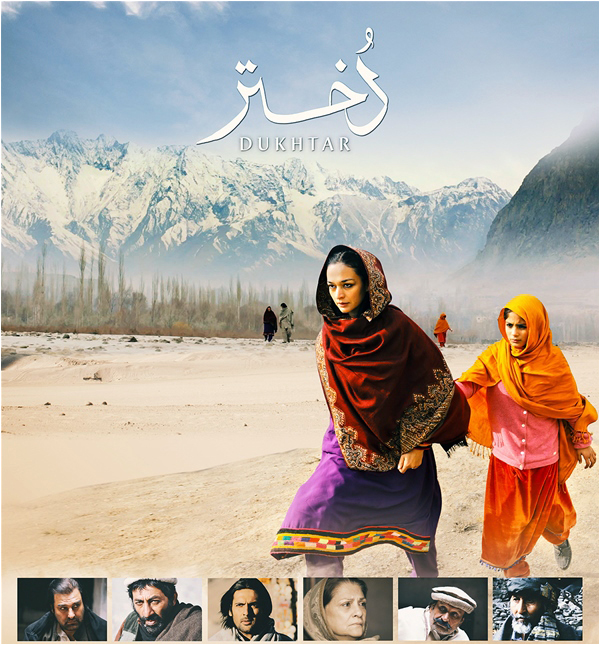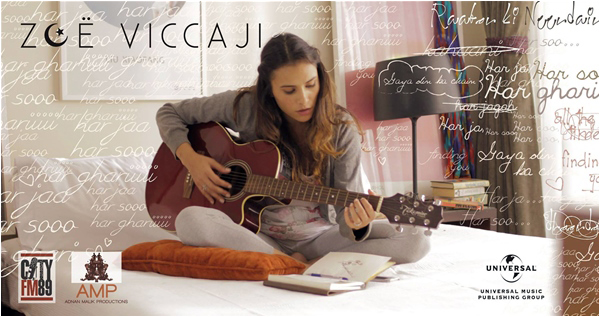
Zindagi Gulzar Hai:
A new Indian television channel is bringing Indians closer to Pakistanis (which is more than one can say for the Modi government) by officially airing Pakistani plays like Zindagi Gulzar Hai and Aun Zahra, a move that is finally challenging the paradox of democratically challenged, terrorism-exporting Pakistan embracing Indians artists and entertainment wholeheartedly while shining, inclusive India drawing an iron veil against Pakistani productions.
It is a testimony to Indian insistence on stereotyping Pakistan as a perpetual backwater infested with oppressed, burqa-clad women that Zindagi Gulzar Hai has been received as the stereotype-breaker of choice for virgin Indian audiences, a play whose lead women characters fulfill every submissive female stereotype there is. From Samina Peerzada’s downtrodden mother unable to produce a son and thus ousted from her home, yet perenially grovelling in front of her husband, to Sanam Saeed’s Kashaf, relegated to a shadow of her former self by the end of the play, all nicely topped off with lectures on a woman’s role in society and the home, Pakistani plays fail to depict the range of experiences that Pakistani women inhabit, especially in the big commercial cities where these stories are often based.
While On a recent trip to the US, my brother drove me past a house in Palo Alto, California that belongs to Hum TV owner Sultana Sidiqui’s son and daughter-in-law. It made me think of that young woman’s life in that privileged little tech town where the very wealthy and liberally inclined reside. Even more so it made me think of her mother’s life, the boss of Pakistan’s biggest entertainment channel, responsible for the livelihoods of thousands of employees; impacting the hearts and minds of millions of Pakistanis across the country. I thought of Moneeza Hashmi, Hum TV’s General Manager International Relations, daughter of Pakistan’s most celebrated poet and the only woman Director Pakistan Television has ever produced. It made me think of Pakistan’s most successful current fiction writer, outselling all her counterparts and churning commercial gold, the reclusive Umera Ahmed. It made me think of Sanam Saeed, a sophisticated young Pakistani woman who started her modelling career at 16 and has excelled at theatre, singing and acting ever since. It made me think of Ayesha Omar, an independent young woman from Lahore making her life and name in a city far away from her family, riding the ladder of success on her own terms. It made me think of Samina Peerzada, an accomplished veteran actor, film director, and liver of life on her own terms. And it made me think how this bevy of successful, independent women all choose to project and perpetuate an image of Pakistani womanhood that is a far cry from their own lifestyles and achievements, firmly keeping their own realities away from the sentimental, restrictive tripe they choose to churn on television, serving what they imagine to be the only dish that is palatable to the vast sweep of middle and lower middle class Pakistan. If Shehnaz Sheikh’s adamant Zara, fired by the desire to regain her dead parents’ house could make her way into the hearts of 80s Pakistani audiences, why have we regressed to a Kashaf and a Khirad 30 years later? Much more than commercialism and audience trends, the women at the helm who are capable of producing something different, the ones who have the influence, the money and the clout, are to be blamed for this cynical pandering to the advertising gods.

Dukhtar:
One can only hope that what is being touted as the revival of Pakistani cinema can potentially pose a challenge to this narrative of victimhood. Afia Nathaniel’s ‘Dukhtar’ that was poised to be in cinemas on August 14 is now being slated for a September 18 release. I am excited for the young director, but purely in terms of depictions of Pakistani women, Dukhtar’s trailer makes me think of an NGO production fixated on driving home a woman-centric message with a hammer. Hopefully, Nathaniel’s touch is deft and light, and her treatment mature enough for Dukhtar not to slide into a mawkish depiction of yet again, the eternally oppressed Pakistani woman.

Phir Mili Tanhaai:
Another platform for expression available to Pakistani artists, albeit small and shrunken now, is music videos. Zoe Viccaji’s latest music video ‘Phir Mili Tanhaai’ that was released on August 18 takes us through a failed relationship starring Zoe Viccaji and Hisham Aziz. Quite apart from its musical merits and demerits, the video pushes the envelope somewhat by starring Viccaji in scenes that earlier Pakistani pop divas, serious about their music, might have been squeamish about. The wardrobe, make-up and depiction of the relationship has a modern, urban sensibility that our cinema and television plays would be well-advised to simulate, a change that Indian cinema saw with the release of Dil Chahta Hai in 2001. Pakistan awaits its Farhan Akhtar.
A new Indian television channel is bringing Indians closer to Pakistanis (which is more than one can say for the Modi government) by officially airing Pakistani plays like Zindagi Gulzar Hai and Aun Zahra, a move that is finally challenging the paradox of democratically challenged, terrorism-exporting Pakistan embracing Indians artists and entertainment wholeheartedly while shining, inclusive India drawing an iron veil against Pakistani productions.
It is a testimony to Indian insistence on stereotyping Pakistan as a perpetual backwater infested with oppressed, burqa-clad women that Zindagi Gulzar Hai has been received as the stereotype-breaker of choice for virgin Indian audiences, a play whose lead women characters fulfill every submissive female stereotype there is. From Samina Peerzada’s downtrodden mother unable to produce a son and thus ousted from her home, yet perenially grovelling in front of her husband, to Sanam Saeed’s Kashaf, relegated to a shadow of her former self by the end of the play, all nicely topped off with lectures on a woman’s role in society and the home, Pakistani plays fail to depict the range of experiences that Pakistani women inhabit, especially in the big commercial cities where these stories are often based.
While On a recent trip to the US, my brother drove me past a house in Palo Alto, California that belongs to Hum TV owner Sultana Sidiqui’s son and daughter-in-law. It made me think of that young woman’s life in that privileged little tech town where the very wealthy and liberally inclined reside. Even more so it made me think of her mother’s life, the boss of Pakistan’s biggest entertainment channel, responsible for the livelihoods of thousands of employees; impacting the hearts and minds of millions of Pakistanis across the country. I thought of Moneeza Hashmi, Hum TV’s General Manager International Relations, daughter of Pakistan’s most celebrated poet and the only woman Director Pakistan Television has ever produced. It made me think of Pakistan’s most successful current fiction writer, outselling all her counterparts and churning commercial gold, the reclusive Umera Ahmed. It made me think of Sanam Saeed, a sophisticated young Pakistani woman who started her modelling career at 16 and has excelled at theatre, singing and acting ever since. It made me think of Ayesha Omar, an independent young woman from Lahore making her life and name in a city far away from her family, riding the ladder of success on her own terms. It made me think of Samina Peerzada, an accomplished veteran actor, film director, and liver of life on her own terms. And it made me think how this bevy of successful, independent women all choose to project and perpetuate an image of Pakistani womanhood that is a far cry from their own lifestyles and achievements, firmly keeping their own realities away from the sentimental, restrictive tripe they choose to churn on television, serving what they imagine to be the only dish that is palatable to the vast sweep of middle and lower middle class Pakistan. If Shehnaz Sheikh’s adamant Zara, fired by the desire to regain her dead parents’ house could make her way into the hearts of 80s Pakistani audiences, why have we regressed to a Kashaf and a Khirad 30 years later? Much more than commercialism and audience trends, the women at the helm who are capable of producing something different, the ones who have the influence, the money and the clout, are to be blamed for this cynical pandering to the advertising gods.

Dukhtar:
One can only hope that what is being touted as the revival of Pakistani cinema can potentially pose a challenge to this narrative of victimhood. Afia Nathaniel’s ‘Dukhtar’ that was poised to be in cinemas on August 14 is now being slated for a September 18 release. I am excited for the young director, but purely in terms of depictions of Pakistani women, Dukhtar’s trailer makes me think of an NGO production fixated on driving home a woman-centric message with a hammer. Hopefully, Nathaniel’s touch is deft and light, and her treatment mature enough for Dukhtar not to slide into a mawkish depiction of yet again, the eternally oppressed Pakistani woman.

Phir Mili Tanhaai:
Another platform for expression available to Pakistani artists, albeit small and shrunken now, is music videos. Zoe Viccaji’s latest music video ‘Phir Mili Tanhaai’ that was released on August 18 takes us through a failed relationship starring Zoe Viccaji and Hisham Aziz. Quite apart from its musical merits and demerits, the video pushes the envelope somewhat by starring Viccaji in scenes that earlier Pakistani pop divas, serious about their music, might have been squeamish about. The wardrobe, make-up and depiction of the relationship has a modern, urban sensibility that our cinema and television plays would be well-advised to simulate, a change that Indian cinema saw with the release of Dil Chahta Hai in 2001. Pakistan awaits its Farhan Akhtar.

